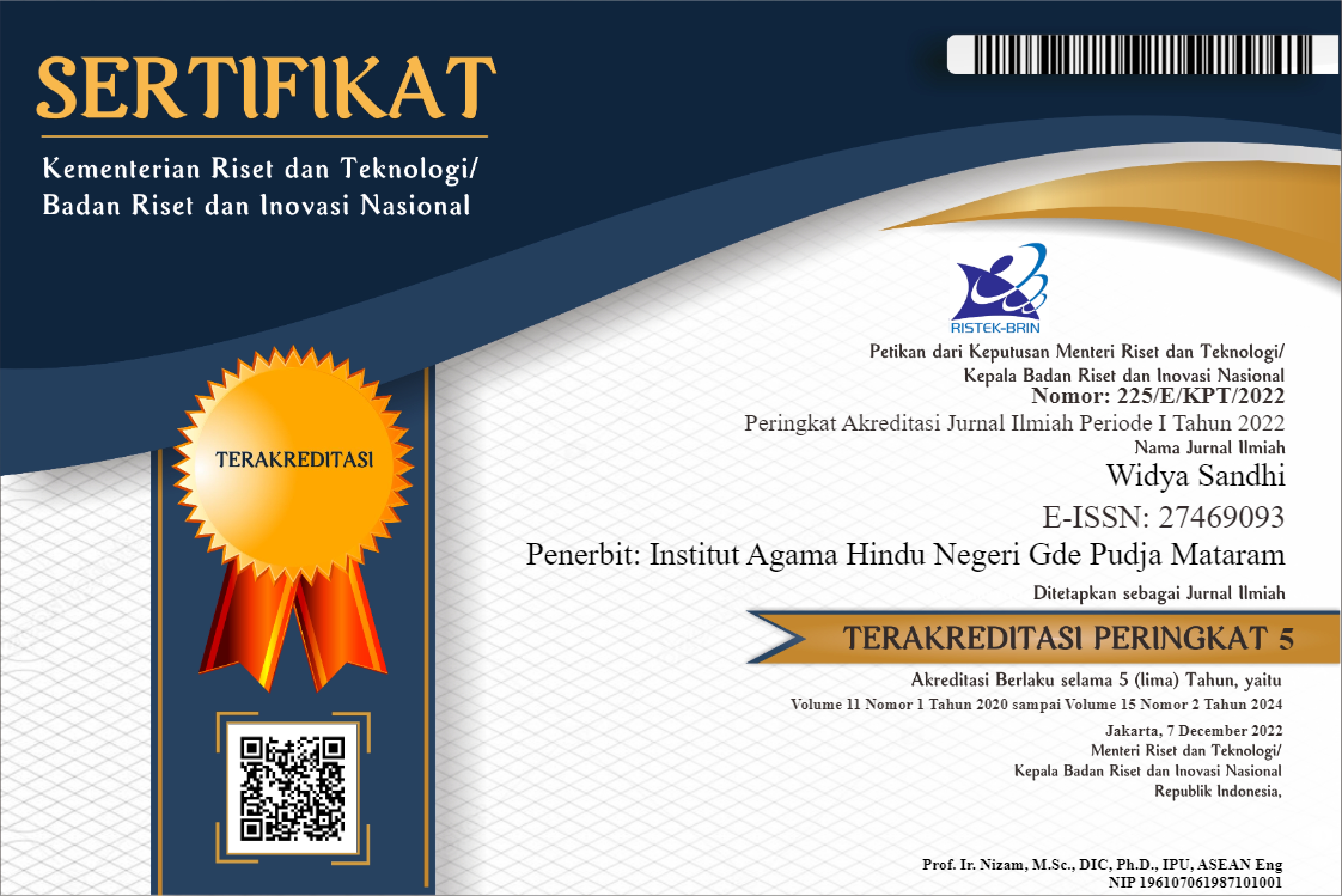Implementasi Konsep Pawongan Dalam Membangun Kerukunan Umat Beragama Di Kabupaten Buleleng
PAWONGAN: KONSEP UNIVERSAL DALAM MEMBANGUN KERUKUNAN SOSIAL
Abstract
Every individual or society is obliged to build a harmonious life with each other. No one can walk alone without involving other people, especially those related to common interests such as death, marriage, customs or other interests. The principle of maintaining harmony is of course highly emphasized. Likewise in relation to relations between religious believers, relations with the environment, groups, and so on. It is not uncommon for relations between groups to be disturbed by internal factors such as a lack of openness and external factors such as incitement or inaccurate information obtained. To deal with problems like this, adaptation strategies by implementing the values of harmony contained in the Pawongan concept are emphasized. Pawongan as a noble heritage contains a message of harmony that must be implemented by every individual in society.
References
Damayana, I. W. (2011). Menyama braya (Studi Perubahan Masyarakat Bali) (Doctoral dissertation, Fakultas Teologi UKSW).
Fajriyah, I. (2017). Pembangunan Perdamaian dan Harmoni Sosial di Bali Melalui Kearifan Lokal Menyama Braya. Jurnal Damai dan Resolusi Konflik, 3(1).
Fatmawati, K. (2021). Menyama Braya dalam Upanisad. JAPAM (Jurnal Pendidikan Agama), 1(01), 62-67.
Nopitasari, N. P. I., & Putrawan, S. (2013). Konsep Tri Hita Karana Dalam Subak. E-Jurnal Ilmu Hukum Kerta Desa, I.
Paramajaya, I. P. G. (2018). Implementasi Konsep Tri Hita Karana Dalam Perspektif Kehidupan Global: Berpikir Global Berperilaku Lokal. Purwadita, 2(2).
Rahmat, M. I. (2003). Islam Pribumi: Mendialogkan Agama Membaca Realitas. Erlangga.
Runa, I. (2012). Pembangunan Berkelanjutan Berdasarkan Konsep Tri Hita Karana untuk Kegiatan Ekowisata.JURNAL KAJIAN BALI (JOURNAL OF BALI STUDIES), 2(1).
Said, N. (2012). Merawat Persaudaraan Sejati di atas Keragaman Agama. Alauddin University Press.
Sastrawan, K. B., & Giri, I. M. A. (2023). Pawongan Sebagai Konsep Multikultur Dalam Ajaran Agama Hindu Di Bali. Purwadita: Jurnal Agama dan Budaya, 7(1), 9-14.
Setia, Putu. 2002. Mendebat Bali. Denpasar: Pustaka Manikgeni.
Setyobekti, A. B., Kathryn, S., & Sumen, S. (2021). Implementasi Nilai-nilai Bhineka Tunggal Ika dalam Membingkai Keberagaman Pejabat Gereja Bethel Indonesia di DKI Jakarta. SOTIRIA (Jurnal Theologia Dan Pendidikan Agama Kristen), 4(1), 1– 10. https://doi.org/10.47166/sot.v4i1.29.
Soethama, Gede Aryantha. 2006. Bolak Balik Bali. Denpasar: Arti Foundation.
Titib, I Made.1996. Veda Sabda Suci Pedoman Praktis Kehidupan. Paramita: Surabaya.
Usman, I. (2023). Islam, Toleransi dan Kerukunan Umat Antar Beragama. Borneo: Journal of Islamic Studies, 3(2), 117-132.
Widiyastuti, Retno. 2010. Kebaikan Akhlak dan Budi Pekerti. Semarang: ALPRIN.

This work is licensed under a Creative Commons Attribution-NonCommercial-ShareAlike 4.0 International License.
Authors who publish with this journal agree to the following terms:
- Authors retain copyright and grant the journal right of first publication with the work simultaneously licensed under a Creative Commons Attribution-ShareAlike 4.0 International License. that allows others to share the work with an acknowledgment of the work's authorship and initial publication in this journal.
- Authors are able to enter into separate, additional contractual arrangements for the non-exclusive distribution of the journal's published version of the work (e.g., post it to an institutional repository or publish it in a book), with an acknowledgment of its initial publication in this journal.
- Authors are permitted and encouraged to post their work online (e.g., in institutional repositories or on their website) prior to and during the submission process, as it can lead to productive exchanges, as well as earlier and greater citation of published work (See The Effect of Open Access).






.jpg)




